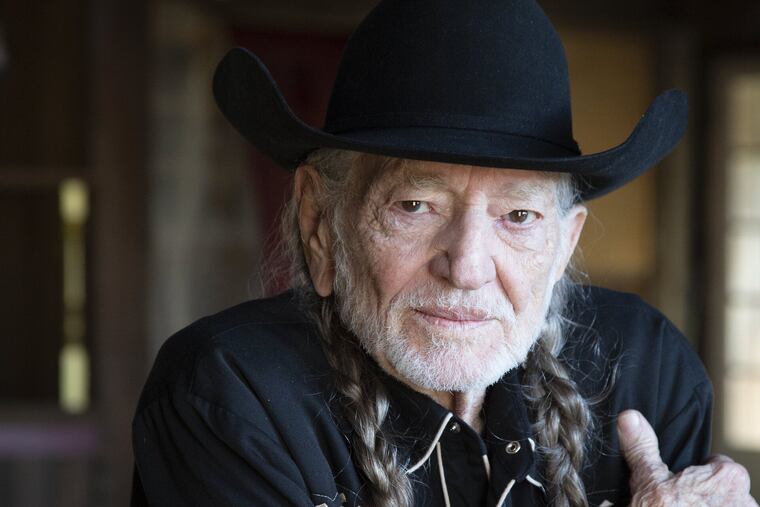Review: Willie Nelson’s Outlaw Music Festival in Camden with Chris Stapleton and Zach Bryan
The 89-year-old giant of American song was in fine form, back on the road again with his annual festival, which also featured Stapleton, Bryan, Larkin Poe, Brittney Spencer, and Particle Kid.

Willie Nelson wasn’t even the most popular act on the bill when his own Outlaw Music Festival came to Camden on Friday night.
In terms of drawing power, it was Chris Stapleton, the bearded country-soul singer who preceded Nelson and is the reason the Outlaw Fest moved across the river from the Mann Center, where it’s played in recent years, to the more capacious (and sold-out) Freedom Mortgage Pavilion.
Or it might even have been Zach Bryan, the Oklahoma-born phenom who was up before Stapleton, whose triple album American Heartbreak topped the country charts in the spring and whose set drew a rowdy, enthusiastic crowd.
But you can be sure that the 89-year-old Nelson — on the road again, as always — was the most beloved figure at the seven-hour-plus fest, which also featured Southern rock sister act Larkin Poe, powerhouse country vocalist Brittney Spencer, and Particle Kid, the project of Nelson’s son Micah.
The living legend’s headlining set was billed as Willie Nelson & Family, and this year, that band name itself was poignant: Nelson’s piano-playing sister, Bobbie, who accompanied him for decades, died at 91 in March.
On Friday, the only blood relative in Nelson’s band was Micah, who sat to the left of his father and duetted with him on three songs: Willie’s moving gospel gem “I Thought About You, Lord” and his own “Die When I’m High (Halfway To Heaven)” and “Everything Is Bull——.”
The latter, an amusing song abut the ephemerality of modern life, featured Willie making cat noises and appearing to enjoy himself immensely, and it was one of a number of songs that provided an opportunity for the genius songwriter and interpreter to display his underrated comedic talents.
The others: his riff on weed and mortality, “Roll Me Up and Smoke Me When I Die”; the Kris Kristofferson cowrite “Write Your Own Songs,” which flips the bird to record execs; and Mac Davis’ “It’s Hard To Be Humble,” which was performed as an all-hands-on-deck finale, as Nelson kept a straight face singing about how difficult it is to keep his ego in check “when you’re perfect in every way.”
And how did Willie look and sound? Excellent on both counts, I’m happy to report — in better shape, and in stronger voice than he did last September at the Mann.
Befitting a man his age who survived an aggressive case of COVID-19 earlier this year, he was dressed responsibly for the chilly autumn night, zipped up in a light down jacket.
He came onstage under his own power but stayed seated throughout the show, occasionally sipping from a coffee cup emblazoned with his name, as was the red bandanna that he tossed to the crowd along with his cowboy hat when he walked off at the end, blowing kisses.
Throughout the just-over-an-hour set, he carried on a musical conversation between his impossibly beat-up 1969 Martin guitar — known as Trigger — and the trademark, sui generis, behind-the-beat Willie Nelson vocal style, which makes every song sound a little surprising, no matter how many times he’s sung it.
Subtle drama was conveyed in tender songs in the New Jersey night, from “Always On My Mind” to “Georgia On My Mind” to “I’ll Love You Till I Die,” which was written for Nelson by Stapleton and Rodney Crowell.
But “Angel Flying Too Close to the Ground,” performed all-but-solo, was the highlight. The band stayed out of Willie’s way as he pulled the pathos out of Trigger, and cut particularly to the quick on an evening that was, first and foremost, about delighting in the presence of a titan of American song while he is thankfully still with us.
Stapleton played to a more packed house than Nelson; there was some emptying out after his 80-minute set ended with the barrel-aged “Tennessee Whiskey” and “Outlaw State of Mind.”
The latter was the only time Stapleton’s bruising, unhurried sound grew tedious and mannered. Otherwise, he was effective, applying his burly, expressive voice to well-crafted songs like “Might as Well Get Stoned,” “Fire Away,” and “Cold.” The last featured an unfussy guitar solo full of feeling.
Stapleton walks the line between country, blues, and Southern rock, and he stands out as unvarnished and not too slick in comparison to many of his country radio compatriots.
His rugged songs cover tried-and-true territory — such as the lonesome plight of the road-weary troubadour in “The Devil Named Music” — but he puts them over with a depth of feeling, often aided on vocals by his wife, Morgane, with whom he teamed up on the affectionate “Joy In My Life.”
Bryan is a 26-year-old Navy vet whose rise has been dramatic. This spring’s 38-song American Heartbreak, which was a breakout hit despite its bulk, was being quickly followed by the nine-song Summertime Blues in July.
He’s overflowing with story songs that make an honest effort to make sense of the world and himself. “I see God in everything, the trees and pain and nights in the spring,” he sang, “So why do I still long for a home?”
That song — “Burn, Burn Burn,” Bryan’s latest single — concludes that life needs to be lived intensely because “we all burn, burn, burn, and die.”
Not exactly a happy ending, but a song that, put over by a terrific, energized band equipped with pedal steel guitar, piano, fiddle and banjo, had a raucous crowd singing along to Bryan’s every word. He’ll be headlining rooms the size of the FMP before he knows it.